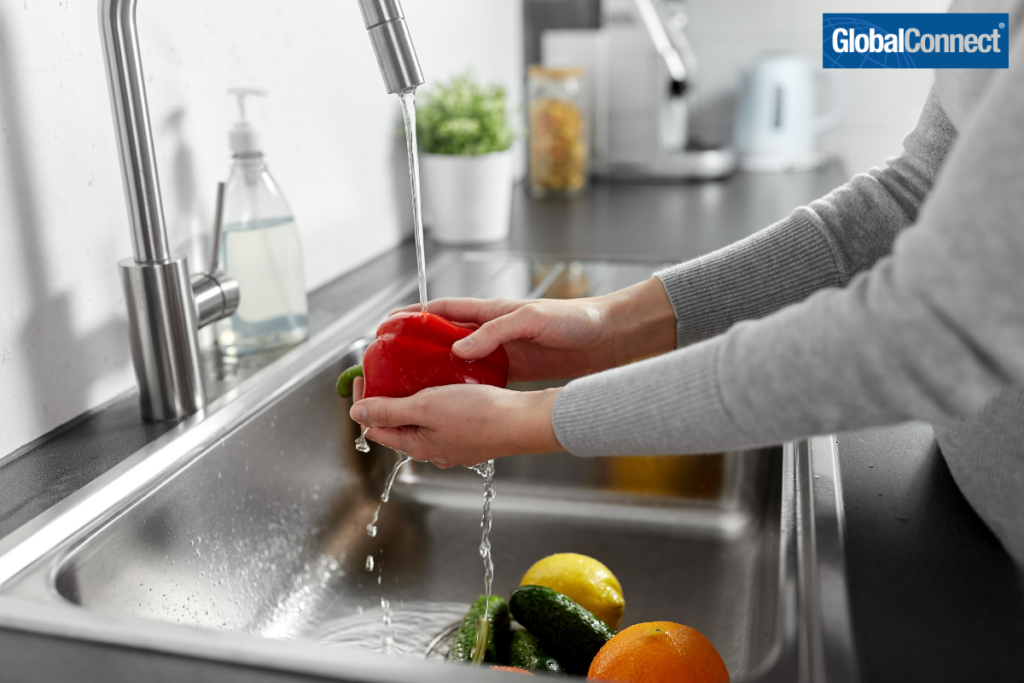As well as being National Healthy Aging Month, September is also Food Safety Education Month, an educational outreach initiative to raise awareness about the steps we can all take to prevent food poisoning.
Keep Your Food Safe
If you’ve ever eaten potato salad that sat out a little too long at a summer cookout or have unknowingly been served undercooked meat at a restaurant, then you know first-hand the distress of food poisoning. Unless you’ve personally experienced a foodborne illness, you may not give too much thought to food safety in your everyday life. Food-borne illnesses are completely preventable, and understanding food safety—the proper handling, preparation, and storage of food—is key to prevention.
Food-borne illness is a public health problem. Every year, an estimated one in six Americans get sick, 128,000 are hospitalized, and 3,000 die from eating contaminated food. Anyone can get food poisoning, but some people are at a higher risk of getting seriously ill from food contamination, including young children, older adults, pregnant women, and people with weakened immune systems.
Keeping your family safe from food-borne illnesses is actually pretty simple. By following four easy steps—clean, separate, cook, and chill—you can help keep your family safe from food poisoning at home. Learn more about all of these steps here.
1. Clean
Germs and bacteria can live in many places around your kitchen including on your hands, in your food, on utensils, and on cutting boards and countertops. That’s why proper cleaning is so important.
- Wash your hands often and the correct way. It’s best to use plain soap and water: skip the antibacterial soaps, and wash your hands under warm, running water for at least 20 seconds while scrubbing your palms, backs, between the fingers, and under the nails. Rinse your hands well and dry thoroughly with a clean, dry towel.
- Clean surfaces and utensils after each use. Use hot soapy water to clean all dishes, utensils, and cutting boards, and wipe down countertops especially after cooking or preparing raw meat, seafood, or eggs. Be sure to wash all dish towels in hot water on a regular basis.
- Wash your fruit and vegetables by rinsing them under plain, warm, running water. Using soap, bleach, or specially made produce washes is not necessary. Dry with a clean paper towel.
- Do not wash meat, eggs, or poultry.
2. Separate
Preventing cross-contamination of different foods is the key to preventing food-borne illnesses.
- Use separate dishes and cutting boards for produce, meat, seafood, and eggs. Use separate utensils for raw or cooked foods.
- Wash all dishes, utensils, and cutting boards in hot soapy water or run them through the dishwasher.
- Place raw meat, poultry, and seafood in individual, sealed plastic bags, and store them in the refrigerator. If you don’t plan to use them in a few days, place them in the freezer.
- Store eggs in the carton they came in, and place them on a shelf in the refrigerator and not on the door.
3. Cook
Always cook food to the correct temperature to ensure that you kill any germs that can cause illness.
- Invest in a good food thermometer, and use it to test the temperature of the cooked food by placing it into the thickest part of the food. Use this chart to determine if your food is cooked to the right temperature.
- If you’re not serving food right away, keep it hot by storing in a chafing dish, slow cooker, or warming tray.
4. Chill
Refrigerate and freeze food properly to prevent spoilage and food-borne illnesses.
- Place perishable foods in the refrigerator within two hours of purchasing from the store.
- Store leftovers in individual containers and refrigerate immediately.
- Do not thaw or marinate food on the counter, only do so in the refrigerator.
- Regularly check food in your fridge, freezer, or pantry for expiration dates. Throw out any food that is past its expiration date or otherwise looks or smells spoiled. Use this guide for recommended storage times for different foods.
